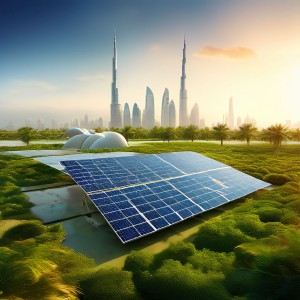
Climate Change COP28 Efforts and UAE Participation
The 28th Conference of the Parties (COP28) on climate change, hosted in December 2023 in the United Arab Emirates (UAE), stands as a pivotal moment in the global battle against the climate crisis. In the face of mounting environmental challenges, nations across the globe converged to deliberate on strategies, policies, and commitments aimed at mitigating and adapting to climate change. COP28, a culmination of years of international cooperation and negotiation, carries profound significance as the international community grapples with urgent imperatives to curb greenhouse gas emissions and foster sustainable development.
Central to the discussions and deliberations at COP28 was the pressing need to accelerate efforts in alignment with the Paris Agreement's objectives. The Paris Agreement, a landmark accord adopted in 2015, signifies a collective commitment to limit global warming to well below 2 degrees Celsius above pre-industrial levels, with efforts to limit the temperature increase even further to 1.5 degrees Celsius. COP28 provided a crucial platform for nations to reassess their climate action plans, ramp up ambition, and forge collaborative pathways towards a low-carbon, resilient future.
As the host nation of COP28, the UAE assumed a pivotal role in shaping the agenda and outcomes of this seminal gathering. Renowned for its ambitious sustainability initiatives and investments in renewable energy, the UAE exemplifies a proactive stance towards combating climate change. The selection of the UAE as the host nation underscored its commitment to fostering international cooperation and driving tangible progress in the global climate agenda.
UAE's participation in COP28 underscored its commitment to advancing climate action on both regional and global scales. With its diverse economy and strategic geopolitical position, the UAE recognized the interconnectedness of climate change with various socio-economic sectors, ranging from energy and transportation to agriculture and urban development. By actively engaging in COP28, the UAE aimed to showcase its leadership in sustainability, catalyze innovation, and mobilize resources towards scalable climate solutions.
One of the focal points of UAE's engagement in COP28 lay in its efforts to accelerate the transition towards renewable energy and decarbonize its economy. Over the years, the UAE has made significant strides in diversifying its energy mix, with notable investments in solar, wind, and nuclear power generation. Through initiatives such as the Mohammed bin Rashid Al Maktoum Solar Park and the Barakah Nuclear Power Plant, the UAE underscored its commitment to reducing carbon emissions and fostering energy security.
Moreover, the UAE recognized the importance of fostering climate resilience and adaptation measures to safeguard vulnerable communities and ecosystems against the impacts of climate change. From implementing sustainable water management practices to enhancing coastal protection infrastructure, the UAE's adaptation efforts prioritized holistic approaches that integrated climate resilience into development planning and infrastructure projects.
In addition to domestic actions, the UAE played an active role in advancing climate diplomacy and cooperation at the international level during COP28. Through platforms such as COP28, the UAE sought to foster dialogue, knowledge exchange, and collaboration among nations, with a view to mobilizing collective action and leveraging expertise and resources towards shared climate goals. By fostering partnerships with governments, civil society, academia, and the private sector, the UAE endeavored to catalyze transformative change and unlock new opportunities for sustainable development.
Furthermore, the UAE's engagement in COP28 underscored its commitment to inclusive and equitable climate action, recognizing the importance of addressing the needs and aspirations of vulnerable communities, including small island states, least developed countries, and indigenous peoples. Through initiatives such as the UAE-Pacific Partnership Fund and the Abu Dhabi Fund for Development, the UAE extended its support to climate-vulnerable nations, helping build resilience, enhance adaptive capacity, and promote sustainable livelihoods.
As COP28 concluded in December 2023, the international community faced a critical juncture in the fight against climate change. Urgent and concerted action was needed to bridge the gap between current emissions trajectories and the targets outlined in the Paris Agreement. With the UAE at the helm of COP28, there existed a unique opportunity to galvanize momentum, foster ambition, and chart a course towards a sustainable and resilient future for all.
In conclusion, COP28 represented a defining moment in the global response to climate change, with the UAE's participation signaling its unwavering commitment to driving climate action and accelerating progress towards a low-carbon, sustainable future. As nations convened to deliberate on strategies and commitments, the outcomes of COP28 would reverberate far beyond its proceedings, shaping the trajectory of climate policy and action for years to come.
